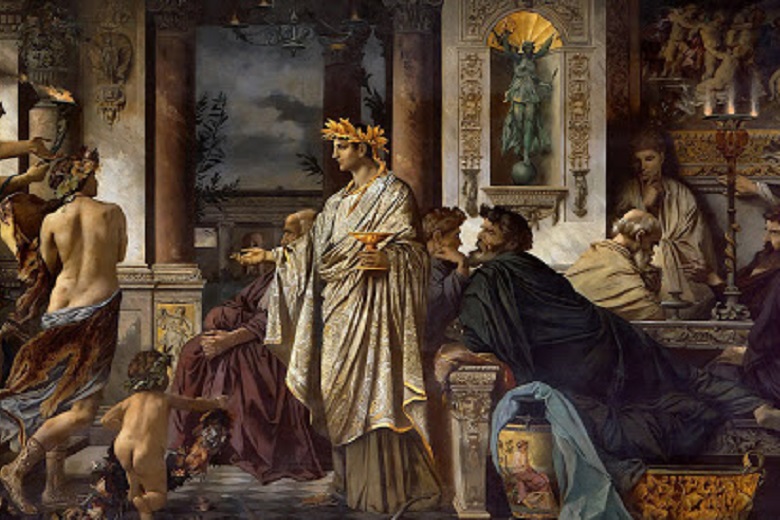The ancient Greeks, who valued moderation in everything, at the same time knew how to enjoy life. A trendy entertainment event they had was the so-called “symposia”. The current scientific severe name “symposium” comes from there, from Ancient Greece. How did these symposia go?
Usually, people of similar spirits were invited to the symposium. After all, they got together not so much to have a tasty meal, but more to have a hearty conversation, to relax. Any event, both significant and not so, could serve as a reason for its holding. As they say, there would be a desire, but there will be a reason.
For such feasts, a place was allocated in the house where the men lived – in the andron.
Decent women were not invited to such feasts because it was considered highly indecent for ladies to participate in feasts, except the hetaerae, designed to entertain the audience. On the contrary, they were specially invited.
The guests, who were called symposiasts, prepared for the symposium very thoroughly, postponing all other matters – they washed thoroughly, rubbed themselves with incense, and put on special festive clothes – usually, it was a tunic wreath of grape leaves, ivy, and myrtle. And they tried not to be late – the Greeks considered it bad form, and they were never expected to be late; they started without them.
Arriving at the house, the guests took off their shoes, the slaves washed their feet, and at the direction of the owners, the guests took the places reserved for them in advance. They settled on special dining boxes – Klinai, richly decorated and covered with fluffy fabric with exquisite patterns. These lodges were installed so that during the meal, it was possible to recline on them, leaning on their left hand quietly, and at the same time almost did not have to move.
At the appointed time, small tables with snacks and wine appeared. For convenience, the tables were below the sun loungers. Slaves and servants brought water to the guests in a special vessel for washing their hands, and after that, a feast began.
There were no forks and spoons at that time, so the Greeks ate with their hands, the leftovers flew straight to the floor. There they were eaten by dogs. Instead of napkins, they used pieces of bread, which were then also thrown away to the dogs.
After the central part of the feast and libations, a conversation began, sometimes intellectual, sometimes not very much. It was predetermined who would be the main person in charge of the feast, the symposium’s host. They could talk on any topic – about politics, about wars, literature, philosophical topics, and topics of morality, or discuss pressing issues – the prices of crops and overseas goods.
The Greeks drank wine diluted with water 1: 2 or 1: 3, the role of cupbearers was usually played by young youths. Beautiful hetaerae were also served at the feast.
The duties of the symposiarch were to follow the course of the conversation, to direct it in the right direction. The use of witty witticisms, apt quotes, and poetic lines during the conversation was highly appreciated and welcomed; some quickly composed them on the fly.
The hetaerae, who were specially trained to do this, were very good at keeping up a conversation. Therefore, it was engaging with them. Sometimes all of them would go together to solve a fascinating problem suggested by one of the guests.
The symposiarch did not forget to monitor the guests’ state – who should pour more and who already had enough. Also, the main manager determined how much water to add to the wine, who would make the toast…
Dancers, acrobats, and singers performed.
From time to time, the companions themselves dragged on drinking songs, which the Greeks called Komos. Light wines and the sweet music of flutists excited the blood.
Many Greek vases depict the moments when the Greeks enthusiastically listen to music played on flutes.
During the feast, the Greeks loved to arrange various funny competitions – for example, they splashed liquid on the accuracy, most often it was the remnants of wine, or they tried to hold the vessel, but not with their hands, but, say, on the leg or teeth.
Although they drank a lot of wine during the feast, they did not get too drunk; the Greeks did not accept this. It was believed that you could drink as long as you feel that you can get home yourself. But not everyone succeeded – people are people.
Some, drunk, in a fit of unrestrained fun, could begin to break the dishes. Or write various obscenities on the dishes and the walls. And archaeologists did find such inscriptions, clearly made by drunk Greeks, on some of the fragments. Such guests, of course, had to be brought home after the feast.
